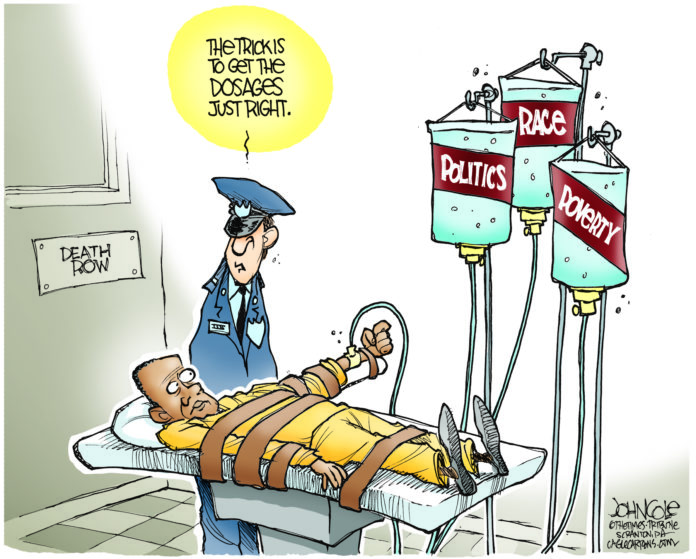BY RICHARD L. FRICKER
 It’s a sad day, indeed, when a governor and attorney general are deprived of the opportunity to assure the public of the sanctity of life by killing a couple of guys just before they file for re-election. It is equally sad pondering the attorney general schlepping down back streets looking for death drugs, but so it is in pre-primary Oklahoma.
It’s a sad day, indeed, when a governor and attorney general are deprived of the opportunity to assure the public of the sanctity of life by killing a couple of guys just before they file for re-election. It is equally sad pondering the attorney general schlepping down back streets looking for death drugs, but so it is in pre-primary Oklahoma.
As it now stands, Clayton Derrell Lockett and Charles Fredrick Warner will not die on a state owned gurney after being injected with deadly fluids from an unknown source this month. Their executions have been reprieved until April 22 and 29, respectively.
It seems the state has run out of the death drugs pentobarbital and vecuronium bromide. None seem to be available because manufacturers will no longer sell the stuff for the purpose of execution.
The two inmates won their reprieves by filing a lawsuit challenging the 2011 state law that cast a shroud over the execution protocol. According to a 2011 state law, nothing about Oklahoma’s execution protocol is to be made public – the type of drugs to be used, the source of drugs, executioners, or anything else about an execution is to be made available to the public.
So much for government transparency.
Much about the states’ struggle to obtain drugs for execution is contained in a “most excellent” Colorado Independent article by Tulsa writer Katie Fretland. Her article also notes the state has paid out roughly $50,000 in cash for death drugs out of a petty cash account.
Attorney General Pruitt told the Court of Criminal Appeals the state is out of drugs, but searching for a new undisclosed source. There has been no explanation as to what happened to the previously purchased toxins since they had purchased more than enough for the executions carried out under Pruitt’s and Gov. Mary Fallin’s watchful eyes.
The court, in what could be construed as a vote of no confidence, granted the stays of execution, noting they doubted Pruitt and his crew could find the necessary drugs before the scheduled March execution dates.
Oklahoma and a few other states have been using “compounding pharmacies” such as the Apothecary Shoppe in Tulsa, which until recently supplied death drugs to Missouri to the tune of $20,000 a pop with a no disclosure proviso – until the state was taken to court by a team of attorneys.
With all the drug money floating around, a good question would be: How much does the executioner earn? According to documents uncovered by Fretland, Oklahoma pays $300 for the taking of a life.
The fan index cost for a family of four to attend a Thunder basketball game is $237.40. From the death house to downtown Oklahoma City takes two hours and nine minutes, according to Mapquest. Presumably an executioner could kill an inmate, grab the cash and still get the wife and kids to the game in time for tip off.
Executions have always been considered sure-fire vote-getters by conservatives. The current Tea Party/Evangelical infestation at the Capitol has taken the blood quest to new heights.
Make no mistake: Lockett and Warner are not sympathetic figures. They have both been convicted of particularly heinous murders.
The question arises: if you’re having that much trouble killing these guys, and no one wants to help you kill them, why not commute the sentences to life without possibility of parole? After all, Oklahoma juries have fallen out of love with the death penalty. Nationally executions have dropped appreciably and eventually cost more than imprisonment.
Fallin and Pruitt are seasoned politicians. Both know the hazards of appearing soft on crime in a state where the political moral standard is set by Tea Party and evangelical ideologues.
They are also painfully aware of the fate suffered by many Republicans who have been challenged by these ideologues in primary elections. It therefore becomes prudent to placate rather than offend, at least until after the registration period closes.
Neither the governor nor the attorney general have as yet drawn an ideologue challenge. Doubtless they would like to avoid a family fight in a year when re-election, at present, seems more likely than not.
The irony here is the “sanctity” of life apparently extends only until the moment of birth; after that, you’re on your own.
Therefore, the question must be asked: are these executions in fact a quest for justice? Or are these executions, as well as the two previous deaths of men recommended for clemency, an attempt to hold ideologues at bay until after the candidate filing period?
Only Fallin and Pruitt can answer those questions. But every voter should be asking if inmates have been dying for votes.
– Richard L. Fricker lives in Tulsa, OK, and is a regular contributor to The Oklahoma Observer. His latest book, The Last Day of the War, is available at https://www.createspace.com/3804081 or at www.richardfricker.com.








